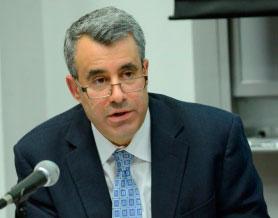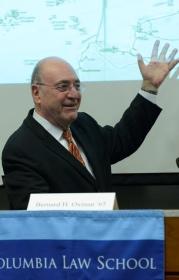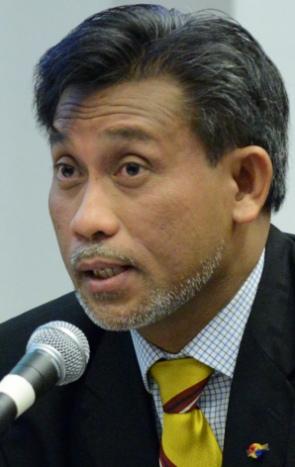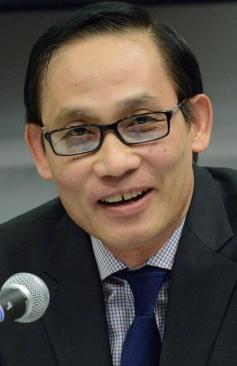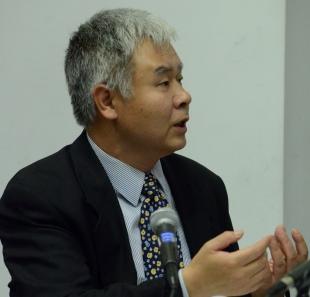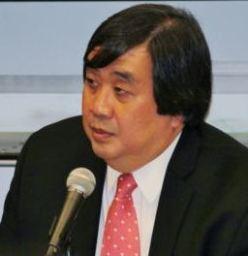Experts and Diplomats Hold Productive Discussion on Legal Disputes in the South China Sea
Experts and Diplomats Hold Productive Discussion on Legal Disputes in the South China Sea
New York, Nov. 5, 2012—Before a capacity crowd that included representatives from about 30 foreign governments, a high-level panel of government and academic legal experts met Nov. 1 at Columbia Law School to address international legal issues related to current territorial and maritime disputes in the South China Sea.
The participants convened for a roundtable discussion on “International Law and the South China Sea,” hosted by Columbia Law School. The roundtable was the first event held under the aegis of the new Center for Constitutional Governance and was organized by Sarah Cleveland, the Louis Henkin Professor of Human and Constitutional Rights and faculty co-director of the Human Rights Institute.
| Former UK Legal Adviser and Visiting Professor Sir Daniel Bethlehem, QC |
Panelists included senior officials of states with claims in the South China Sea, including Henry Bensurto, Jr., the chief of mission at the Philippines Department of Foreign Affairs; Zhou Jian, counselor for the permanent mission of the People’s Republic of China to the United Nations; and Ambassador H.E. Le Hoai Trung, permanent representative of Vietnam to the United Nations. Former UK Legal Adviser Sir Daniel Bethlehem, QC, currently a visiting professor at the Law School, and current State Department Legal Adviser Harold Hongju Koh also participated. The program was moderated by Bernard Oxman ’65, professor at the University of Miami School of Law and an internationally renowned expert on the law of the sea.
|
|
| Bernard Oxman ’65, professor at the University of Miami School of Law |
The panelists emphasized that they appeared and spoke in their personal capacities and not as representatives of their respective countries or organizations.
The disputes in the South China Sea center on islands, including the Paracel and Spratly islands (as they are known in English), which along with their surrounding waters are potentially rich in resources like oil and natural gas. The islands are currently occupied or otherwise claimed in part by China, Taiwan, Malaysia, the Philippines, and Vietnam. The same countries and Brunei have overlapping claims to maritime areas in the South China Sea.
The South China Sea dispute is "one of the most important, least understood international law issues of our time,” Koh observed.
The three main questions to be answered in the dispute are: “Who owns it? What is it? And how do these overlapping interests interact with one another?” said panelist Coalter Lathrop, the founder of Sovereign Geographic, a consultant firm specializing in international boundary issues.
|
|
| Coalter Lathrop, the founder of Sovereign Geographic, a consultant firm specializing in international boundary issues. |
The panelists from Vietnam, the Philippines, and China not only had markedly different views on the answers to these questions, but they also disagreed over the order in which the questions should be answered.
Several speakers, including Oxman and Bethlehem, raised the question of whether the claims over the islands and over the maritime spaces might be dealt with separately, and perhaps in a different order, to facilitate negotiations and avoid a stalemate.
The question of who owns the islands is particularly contentious. The question of what the islands are is less in dispute but has great significance for
the maritime claims that control over the land may generate.
For example, under the United Nations Convention of the Law of the Sea (UNCLOS), an “island” that is capable of sustaining human habitation and economic life of its own generates a more substantial bundle of maritime rights to the surrounding sea—including a claim to a 200-mile exclusive economic zone—than would a “rock” that lacks such characteristics and only is entitled to a surrounding 12-mile territorial sea. Lathrop observed that addressing the second question first—establishing what the relevant land masses are and the maritime claims to which they are entitled—might help diffuse the core disagreements over ownership.
| Henry Bensurto, Jr., the chief of mission at the Philippines Department of Foreign Affairs. |
Of the panelists from the disputing countries, Bensurto was the most outspoken in support of disaggregating the questions. He suggested the parties should start with the lowest common denominator. Analogizing the disputes over sovereignty to an infectious disease, Bensurto urged that these disputes might in the short term be put aside, and that the claimants should look to relevant maritime law to narrow the scope of the disputes. Bensurto also characterized the Chinese claims as the most expansive and expressed the view that if these claims are accepted as the starting point of negotiations, then the dispute is much larger than it needs to be.
The Chinese panelist disagreed, arguing against the separation of questions of maritime territory from questions of sovereignty. Zhou articulated the Chinese position that it has long had historical claims to sovereignty over the area that pre-date China’s accession to the United Nation Convention on the Law of the Sea. He suggested that this was the basis for China’s claim to the so-called “nine-dash line,” by which China asserts sovereignty over much of the South China Sea.
In response, Ambassador Le of Vietnam countered that historical claims have little validity in modern international law. Otherwise, Le noted, Rome and Mongolia would have sovereignty over much of Europe. The participants from Vietnam and the Philippines both rejected the suggestion that the nine-dash line had any basis in international law.
Le emphasized that while Vietnam is supportive of joint exploration of some areas, a joint exploration is unacceptable in areas that are near the Vietnamese coast. Going forward, Le hoped that the countries might be able to conclude a Code of Conduct among Association of Southeast Asian Nations (ASEAN) member states and China.
|
|
| Ambassador H.E. Le Hoai Trung, permanent representative of Vietnam to the United Nations. |
| Zhou Jian, counselor for the permanent mission of the People’s Republic of China to the United Nations. |
While all the panelists reiterated the importance of peacefully resolving the dispute through the framework of international law rather than in the sphere of politics, Zhou questioned whether law would necessarily supply solutions to the current problems.
U.S. State Department Legal Adviser Koh suggested that international law could guide and encourage peaceful actions and negotiations between the countries, just as drivers in lower Manhattan are still guided by traffic laws in the absence of street lights and power in the aftermath of Hurricane Sandy.
Koh underscored that legal questions should be distinguished from political claims in the region. Like many of the panelists, Koh emphasized the importance of airing the various legal positions as a step toward narrowing the issues in dispute and fostering greater understanding.t
| State Department Legal Adviser Harold Hongju Koh |
“The event highlighted the Center’s role in providing a ‘safe forum’ to vigorously air and parse complex international legal positions,” Cleveland said, “and provided an opportunity to enhance transparency and understanding and to foster greater ties between academia and governments.”
All agreed that the panel was a pathbreaking forum for debating the merits of the legal issues and urged that serious public discussion would help clarify and narrow the dispute and help promote a peaceful resolution of these matters going forward.
